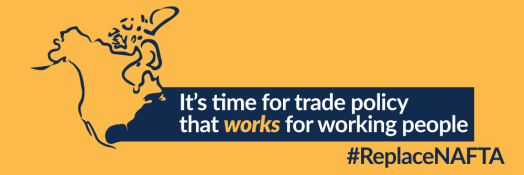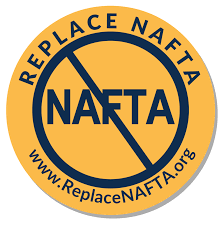 Did you like NAFTA? Then you’ll surely love neoNAFTA, Son of NAFTA, actually known as USMCA for United States Mexico Canada Agreement. As seen below, there are areas where Trump’s new version is better than the old one, but it’s not good enough, especially since the worst areas are what we care about most (ISDS tribunals remain for oil and gas), or are nice, comforting language without clear enforcement provisions (like about labor rights).
Did you like NAFTA? Then you’ll surely love neoNAFTA, Son of NAFTA, actually known as USMCA for United States Mexico Canada Agreement. As seen below, there are areas where Trump’s new version is better than the old one, but it’s not good enough, especially since the worst areas are what we care about most (ISDS tribunals remain for oil and gas), or are nice, comforting language without clear enforcement provisions (like about labor rights).
Last week, we (Replace NAFTA) began conducting a full review of all 900 pages of the re-branded NAFTA 2.0. and released this in-depth summary of the agreement as a result.
While this renegotiated deal includes some important improvements for which we have long advocated, there are key areas where the agreement falls short from needed changes or is worse than the original.
This week, we hope to make sense of some of the complex legal language for you and explain what this all means for our core demands and the movement to replace NAFTA. Below is a brief summary of some of the most notable areas of concern:
Harmful provisions in the text that must be fixed:
- The improved labor standards must be made subject to swift and certain enforcement, or they will be worthless, and U.S. companies will continue to outsource jobs to Mexico to pay workers poverty wages, dump toxins and bring their goods back here for sale.
- Major handouts for Big Pharma must be cut from the text, including a 10-year monopoly period for biologic medicines. These new monopoly terms would allow the corporations to keep medicines unaffordable by avoiding generic competition. The terms could undermine Congress’ plans to make medicines more affordable for Americans while also raising prices in Canada and Mexico.
- Despite President Donald Trump’s “Buy American/Hire American” rhetoric, the new deal maintains NAFTA’s waiver of Buy American rules that require the U.S. government to procure U.S.-made goods. Unless that gets fixed, more U.S. tax dollars and more U.S. jobs will be outsourced.
Improvements in the text that we must preserve:
- ISDS system is terminated between the U.S. and Canada. With Mexico, investors mainly lose their current expansive investor protections, and ISDS is dramatically scaled back.
- There is a first-time-ever innovation that conditions NAFTA’s duty-free benefits for autos or auto parts on paying workers who produce them $16 per hour or more.
- Provisions have been added to strengthen labor standards, including terms that could end the scourge of fake “protection” unions in Mexico that have helped ensure that Mexican wages today are even lower in real terms than when NAFTA started 24 years ago.
- The text eliminates damaging terms that forced countries to continue to export natural resources they seek to conserve.
- Longstanding safety and environmental problems relating to Mexico-domiciled trucks’ access to U.S. roads are addressed.
- Rules of origin that allowed goods with significant Chinese and other non-North American value have been tightened.
Pushing for improved enforcement for the new deal’s labor and environmental provisions will be key, as will the elimination of new giveaways to Big Pharma.
There is still time (though not much) to get some of these needed changes made. Before signing this NAFTA 2.0 text, Congress must first approve an implementation bill, so we need to make sure our representatives know what we think is good, bad and missing from the text.
Replace NAFTA will send updates on next steps, so join their mailing list.









